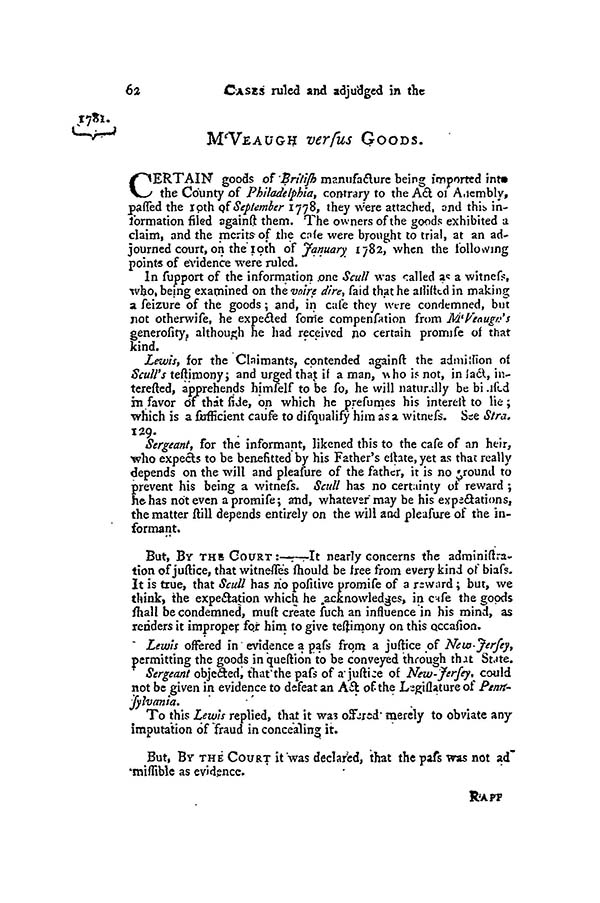M'Veaugh v. Goods, 1 Dall. 62 (Pa. 1781)
Supreme Court of Pennsylvania
September Term, 1781
M'Veaugh versus Goods.
Certain goods of British manufacture being imported into the County of Philadelphia, contrary to the Act of Assembly, passed the 10th of September 1778, they were attached, and this information filed against them. The owners of the goods exhibited a claim, and the merits of the case were brought to trial, at an adjourned court, on the 10th of January 1782, when the following points of evidence were ruled.
In support of the information one Scull was called as a witness, who, being examined on the voire dire, said that he assisted in making a seizure of the goods; and, in case they were condemned, but not otherwise, he expected some compensation from M'Veaugh's generosity, although he had received no certain promise of that kind.
Lewis, for the Claimants, contended against the admission of Scull's testimony; and urged that if a man, who is not, in fact, interested, apprehends himself to be so, he will naturally be biased in favor of that side, on which he presumes his interest to lie; which is a sufficient cause to disqualify him as a witness. See Stra. 129.
Sergeant, for the informant, likened this to the case of an heir, who expects to be benefitted by his Father's estate, yet as that really depends on the will and pleasure of the father, it is no ground to prevent his being a witness. Scull has no certainty of reward; he has not even a promise; and, whatever may be his expectations, the matter still depends entirely on the will and pleasure of the informant.
But, By the Court:—It nearly concerns the administration of justice, that witnesses should be free from every kind of biass. [sic] It is true, that Scull has no positive promise of a reward; but, we think, the expectation which he acknowledges, in case the goods shall be condemned, must create such an influence in his mind, as renders it improper for him to give testimony on this occasion.
Lewis offered in evidence a pass from a justice of New Jersey, permitting the goods in question to be conveyed through that State.
Sergeant objected, that the pass of a justice of New-Jersey, could not be given in evidence to defeat an Act of the Legislature of Pennsylvania.
To this Lewis replied, that it was offered merely to obviate any imputation of fraud in concealing it.
But, By the Court it was declared, that the pass was not admissible as evidence.
Citation: M'Veaugh v. Goods, 1 U.S. 62, 1 Dall. 62 (Pa. 1781)

Last modified: December 11, 2014